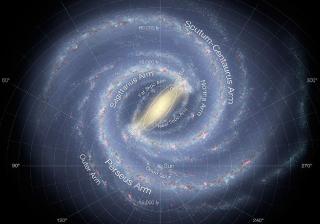Bibcode
Vicente, B.; Abad, C.; Garzón, F.; Girard, T. M.
Referencia bibliográfica
Astronomy and Astrophysics, Volume 509, id.A62
Fecha de publicación:
1
2010
Revista
Número de citas
9
Número de citas referidas
8
Descripción
Context. The historic plates of the Carte du Ciel, an international
cooperative project launched in 1887, offer valuable first-epoch
material for the determination of absolute proper motions. Aims:
We present the CdC-SF, an astrometric catalogue of positions and proper
motions derived from the Carte du Ciel plates of the San Fernando zone,
photographic material with a mean epoch of 1901.4 and a limiting
magnitude of V 16, covering the declination range of -10° ≤
δ ≤ -2°. Methods: Digitization has been made using a
conventional flatbed scanner. Special techniques have been developed to
handle the combination of plate material and the large distortion
introduced by the scanner. The equatorial coordinates are on the ICRS
defined by Tycho-2, and proper motions are derived using UCAC2 as
second-epoch positions. Results: The result is a catalogue with
positions and proper motions for 560 000 stars, covering 1080
degrees2. The mean positional uncertainty is 0farcs20
(0farcs12 for well-measured stars) and the proper-motion uncertainty is
2.0 mas/yr (1.2 mas/yr for well-measured stars). Conclusions: The
proper motion catalogue CdC-SF is effectively a deeper extension of
Hipparcos, in terms of proper motions, to a magnitude of 15.
The Astrometric catalog is only available in electronic form at the CDS
via anonymous ftp to cdsarc.u-strasbg.fr (130.79.128.5) or via
http://cdsweb.u-strasbg.fr/cgi-bin/qcat?J/A+A/509/A62
Proyectos relacionados

Morfología y dinámica de la Vía Láctea
El Proyecto se estructura en dos partes, diferenciadas pero complementarias: morfología y dinámica. El estudio detallado de la morfología de la Vía Láctea pretende proveer una base de datos de distribución estelar en las regiones más alejadas y extintas de nuestra Galaxia, mediante el desarrollo de modelos semiempíricos a partir de la información
Martín
López Corredoira